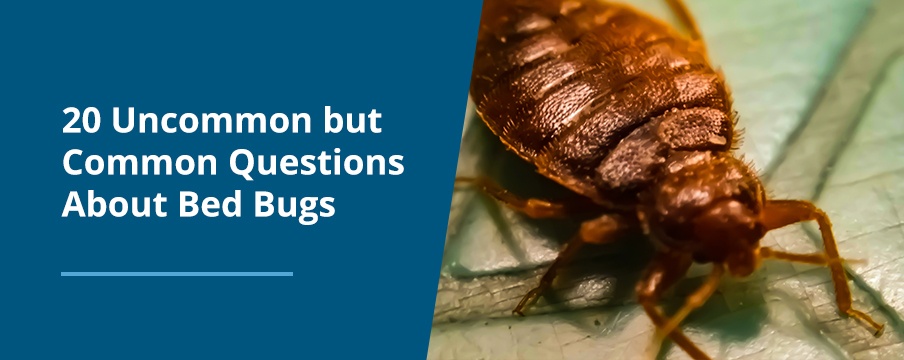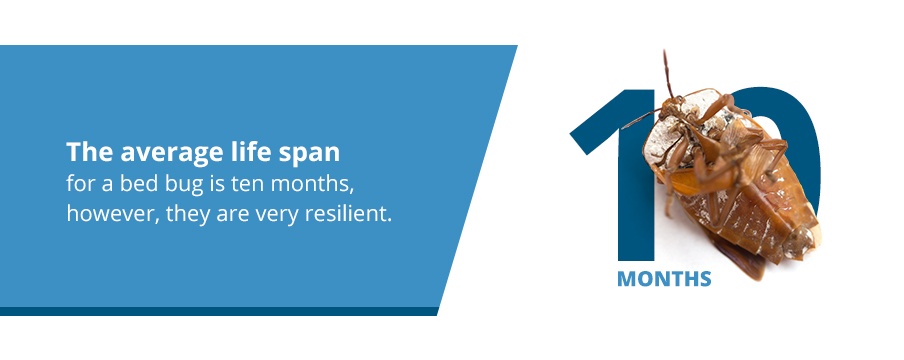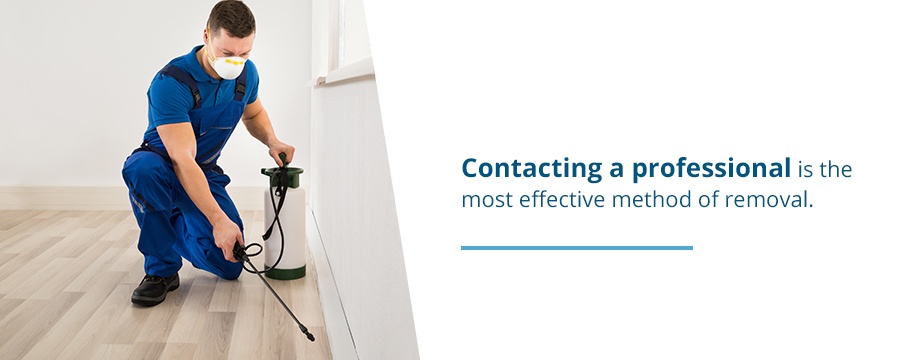20 Uncommon but Common Questions About Bed Bugs
Questions you may not be asking your pest control specialist, but we know you’re asking.

If you’ve noticed red, itchy welts on your skin or found blood smears on your furniture, you may have a bed bug infestation. These small, disc-like brown bugs survive on the blood of animals, including humans. They are experts at hiding though they do leave behind itchy marks, sometimes triggering allergic reactions, and stains on linens and mattresses. If you have an infestation, it’s nearly impossible to get rid of on your own, so if you notice any of these signs, we recommend contacting a professional!
Pestech is here to help. Below we’ve answered your burning bed bug questions, and are happy to answer more during an inspection of your home or business today!
1. Do Bed Bugs Bite Cats and Dogs?
Although bed bugs typically prefer human blood, they can also feed on any warm-blooded animal, including cats and dogs.
2. Can Bed Bugs Live in Your Hair?
While it is possible for bed bugs to live in your hair, it’s unlikely. Any bed bug sighting while combing your locks is likely a one-time result of misdirection or accident. Bed bugs prefer skin with easily accessible blood vessels. If you’re worried, you can comb, wash and dry your hair thoroughly with a hairdryer.
3. Can Bed Bugs Live in Your Carpet?
Technically yes, bed bugs can live in your carpet. However, it’s not their first choice. Bed bugs prefer to stay within 8 feet of where humans sleep for easier access to food.
4. Do Bed Bugs Have Wings?
No, bed bugs do not have wings and do not fly. They have small, thin oval-shaped bodies and six legs that let them scurry quickly.
5. Can You Feel Bed Bugs Crawling on You?
It is possible to feel bed bugs crawling across your skin, especially when you’re lying in bed or when multiple bugs are feeding at once. However, it’s equally possible to imagine the crawling sensation, even after a pest expert has removed bed bugs from your home. Bed bug infestations can leave homeowners with psychological distress that may manifest in this way.
6. Does Alcohol Kill Bed Bugs?
Alcohol can have detrimental effects on bed bugs. However, this is not always 100% effective.
When a bug comes into direct contact with rubbing alcohol, the solution may dry up its outer casing and insides, including eggs. For alcohol to be truly affective, you would need to spray every single bed bug — a nearly impossible feat, thanks to their ability to spread quickly and hide well. Filling your home with alcoholic fumes is also dangerous.
7. Does Bleach Kill Bed Bugs?
Similarly to alcohol, undiluted bleach may be able to kill a bed bug, but it’s not 100% effective and poses a serious threat to your health. Bleach only has a chance against bed bugs if it comes into direct contact, which is a highly ineffective long-term solution. Additionally, bleach can hurt your skin and respiratory system. Once you have worked with a pest control service to eradicate your infestation, you can use bleach to clean up remaining blood stains or residue.
8. How Common Are Bed Bugs?
Unfortunately, bed bugs are a widespread problem. They are especially prevalent in cities and shared spaces, like hotels, school campuses, nursing homes, apartment complexes and condos.
9. How Do Bed Bugs Spread?
Bed bugs attach to secondhand furniture, clothes, shoes and more to hitch a ride into your home. Once inside your home and near a food source — often in your bedroom — adult females can lay two or more eggs per day. Eggs are nearly impossible to spot, thanks to their light-colored shells. Under ideal conditions, they will reach maturity in about a month, at which point the egg hatching cycle will restart.
Learn more about where bed bugs come from and hide in your home in our online guide here.
10. How Long Do Bed Bugs Live?
The average life span for a bed bug is ten months, however, they are very resilient. If necessary, adults can sometimes last several months or even more than a year without feeding.

11. Where Do Bed Bugs Hide on Your Body?
Bed bugs do not typically hide on the body. They prefer to feed, then move back to their hiding place until they are hungry again. In some cases, they may hide in your clothes or the soles of your shoes.
12. Should You Throw Away Your Mattress and Pillows After an Infestation?
Whether or not you should toss your blankets, pillows and any other belongings depends on the severity of the infestation and efficacy of the treatment. Ask your pest expert for a recommendation based on your specific case.
In some cases, you may need to replace mattresses, sheets or pillowcases due to the bloodstains and residue bed bugs leave behind.
13. Are Bed Bugs Hard to Get Rid Of?
Bed bugs are a notoriously challenging pest to get rid of. Much of this difficulty is because many homeowners try to clear the problem themselves, spending a lot of time and money on methods that do not work and are unsustainable. By the time they have called a pest control service, the problem may have grown to a full-blown infestation. Bed bugs are skilled hiders and survivors. The only way to get rid of an infestation is to eliminate every bug and egg. Professionals are trained to locate and eradicate bed bugs entirely.
14. What Is the Number One Cause of Bed Bugs?
Bed bugs have always existed, and no home is immune from an infestation, no matter how clean and clutter-free. While certain environments make it easier for bed bugs to hide, the leading cause of an infestation is a hitchhiking bed bug that was able to hatch eggs inside your home safely and without detection.
15. Will Washing Clothes Kill Bed Bugs?
Wash all clothes at a minimum of 120 degrees and dry on high heat for at least 10 minutes to kill possible eggs and bed bugs. Place all delicate items unsafe for laundering in a bag or tote and set in direct sunlight for at least 24 hours.
16. Can You See Bed Bugs?
Adult bed bugs are dark reddish-brown, after they feed at least once. Until then, young “nymphs” and starving adults are more of a yellowed translucent color.
17. Are Bed Bugs Dangerous?
Bed bug bites are not known for transferring disease, but they sometimes leave behind visible, itchy welts on your skin. These welts may or may not appear, and there is often a delay between when you’re bitten and when physical signs manifest. It’s also possible that these bites trigger an allergic reaction in some victims. If you scratch at the welts and break the skin, an infection may occur. Excessive blood loss due to repeat feedings may worsen or threaten those with anemia or blood disorders. Bed bug shells can also irritate symptoms in asthmatic people.
Aside from physical threats, one of the most significant concerns regarding bed bug infestations is the psychological and lifestyle side effects. An infestation can cause you to lose sleep, resulting in discomfort, exhaustion, sickness and increased anxiety. Infestations may also trigger feelings of embarrassment, hopelessness and paranoia.
18. Can Bed Bugs Get In Your Ears and Other Parts of the Body?
Technically, yes — bed bugs can enter your ears and other parts of your body. However, it is very uncommon and unlikely. Bed bugs feed on warm blood, which they extract directly from skin. They do not need to travel inside the body when their food source is accessible from the outside.
19. How Fast Do Bed Bugs Spread?
Although bed bugs do not fly, they move quickly, often at night when you’re asleep. This makes it easier for them to spread and lay eggs. If you suspect an infestation, begin searching for signs of bed bugs in your bedroom, as they tend to stay close to their food source.
20. What Is the Best Way to Get Rid of Bed Bugs?
The best form of bed bug treatment is prevention. By eliminating your chances of bringing bed bugs into your home, you can reduce the likelihood of dealing with the ramifications of an infestation.
Some ways to help prevent bed bugs include:
- Inspecting hotel room beds and furniture before settling in.
- Inspecting luggage after returning home from a trip.
- Keeping your home clear of clutter, which can hide signs of bugs.
- Covering electrical outlets when not in use.
- Practicing caution when bringing secondhand items into your home.
- Adding a mattress protector to block off seams.
- Understanding the warning signs of an infestation and acting promptly when you suspect one.
Despite your best efforts, bed bugs may still find their way into your house. If this happens, contacting a professional is the most effective method of removal.
Pestech Pest Solutions Will Help You Get Rid of Bed Bugs
Bed bugs can wreak havoc on your home and lifestyle, but you don’t have to handle them on your own. The professionals at Pestech Pest Solutions have extensive training and equipment to help locate and treat all bed bugs, including eggs, and help you develop a prevention plan to minimize your chances of another infestation.
Contact us today to learn more about our bed bug control methods.

